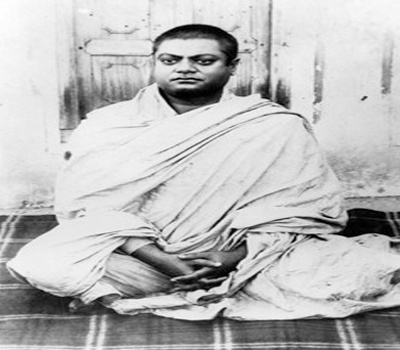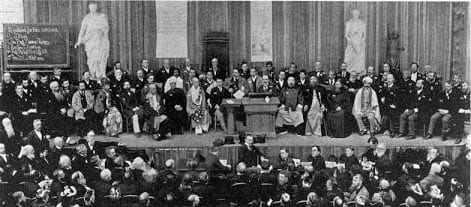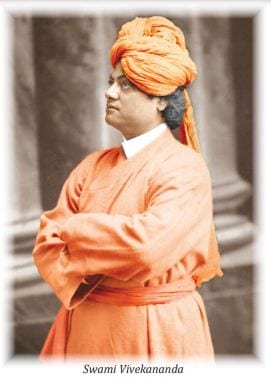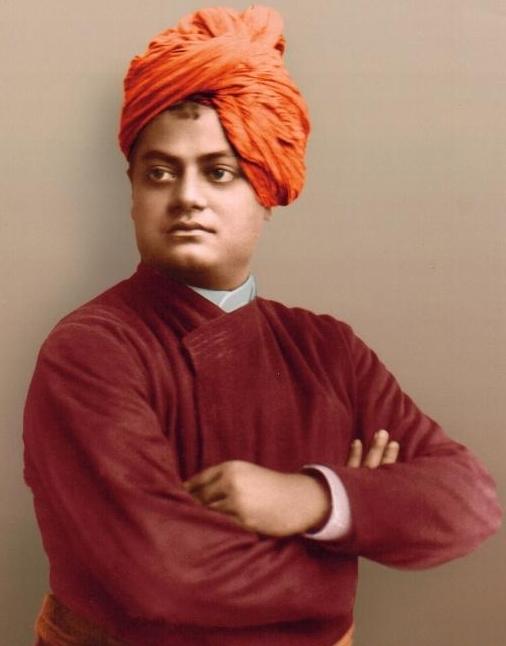October 19, 1892 [Belgaum, Karnataka]
I had been waiting for Swamiji [Swami Vivekananda] from six o’clock in the morning. It struck eight. So without waiting any longer, I left for Swamiji’s place with a friend. There we found him seated in the midst of a respectable gathering of lawyers and other learned men, and carrying on conversation with them. He answered their questions without the slightest hesitation, sometimes in English and sometimes in Hindi or Sanskrit. There were also people like myself who accepted Huxley’s philosophy as their Bible, and started arguing with Swamiji on that basis. But he silenced them all either through repartees or serious dissertation. As I sat there after saluting him, I was thinking, ‘Is he a man or a god?’ So I could not remember all that I heard. I write down only the few words that come to my mind.
A lawyer asked, ‘The Mantras we use in our morning and evening prayers are in Sanskrit, and we do not understand a bit of them. Is it of any use to us to go on uttering them?’
Swamiji replied, ‘They do have good results. Born in a Brahmin family as you are, you can easily learn the meaning of those few Mantras. If you do not do so, who is to blame? Even if you do not understand the meaning, I hope, when you sit for prayer, you have the feeling that you are doing something virtuous and not sinful. If you have the belief that you are doing something meritorious, then that in itself is enough to yield good results.’
Just then somebody said, ‘Talks on religious matters should not be carried on in a foreign language, since it is prohibited in suchand-such a Purana.’
Swamiji replied, ‘It is good to talk of religious things, no matter what the language is.’
In support of this he quoted from the Vedas and added, ‘A judgement passed by a High Court cannot be set at naught by a lower court’ [a reference to the fact that the Vedas are more authoritative than the Puranas].
Thus it went on till it struck nine, when those who had to attend office or court left, while others still sat there. Swami ji’s eyes now fell on me, and he said, ‘My son, I had not the heart to disappoint so many people and go to your place. Please don’t mind this.’ When I pressed him to come and stay with me, he replied at last, ‘I shall go if you can make my host agree to your proposal’. So I persuaded the lawyer friend somehow and returned to my place with Swamiji. His belongings consisted only of a Kamandalu (a water pot used by monks) and a book wrapped in a piece of ochre cloth. Swamiji was then studying French music. . . Some time earlier, somebody had published a poem in the Times asserting that it was extremely difficult to determine what is God, which religion is true, and such other abstruse questions. As that poem had much affinity to my religious ideas of those days, I preserved it carefully. I now produced it before him. He read it and remarked, ‘The man has become confused’. Gradually I got over my hesitation. From the Christian missionaries I had not got any solution of the contradiction involved in holding that God is both just and merciful; and I feared that Swamiji, too, could throw no better light.
When I put the question to him, he said, ‘Methinks you have read much of science. Do not two opposite forces, centripetal and centrifugal—act in each material substance? If such a contradiction can meet in matter, may not justice and mercy be reconciled in God? All I can say is that you have a poor idea of your God.’ I was silenced.
Again, I believed that truth is absolute, and that all religions cannot be true at the same time. In answer to such questions he said, ‘All we know about things now or may know in future are but relative truths. It is impossible for our limited mind to grasp the absolute truth. Hence, though truth be absolute, it appears variously to di verse minds and intellects. All these facets or modes of truth belong to the same class as truth itself, they being based on the same absolute truth. This is like the different photographs of the same sun taken from various distances. Each of them seems to represent a different sun. The diverse relative truths have the same kind of relation with the absolute truth. Each religion is thus true, just because it is a mode of presentation of the absolute religion.’
When I said that faith is the basis of all religions, Swamiji smiled a little and said, ‘A man goes beyond all wants once he becomes a king; but the difficulty is how to become one. Can faith be infused from outside? Nobody can have real faith unless he has personal experience.’ When in the course of talk I called him a Sadhu (holy man), he said, ‘Are we really so? There are holy men whose very sight or touch wakes up spirituality in others.’
Again I asked, ‘Why do the Sannyasins idle away their time in this way? Why do they depend on the charity of others? Why don’t they undertake some work beneficial to society?’
Swamiji said, ‘Now, look here. You are earning this money with such struggle, of which only a little portion you spend on yourself; and some of it you spend for others who, you think, are your own. But they neither acknowledge any gratefulness for what you do for them, nor are they satisfied with what they get. The balance you save like the mythological Yaksha who never enjoys it. When you die, somebody else will enjoy it all; and perchance, he will abuse you for not having accumulated more. This is your condition. On the other hand, I do nothing. When I feel hungry, I let others know by gestures that I want food; and I eat whatever I get. Neither do I struggle nor do I save. Now, tell me who among us is the wiser—you or I?’ I was astonished, for before this nobody dared to talk to me so boldly and frankly.
After lunch we had some rest. Then we went to the house of that lawyer friend, where we had more of such discussion. At nine o’clock at night we returned home. On the way I said, ‘Swamiji, you must have been greatly bored today by all this argumentation.’
He replied, ‘My son, would you have offered me even a morsel of food, if I had kept mum, the out and out utilitarians that you all are? I go on chattering like this. People get amused, and so they crowd around me. But know it for certain that people who argue, or put questions like this before an assembly are not at all eager to know the truth. I also read their motives and answer them accordingly.’
‘Swamiji,’ I put in, ‘how do you get such ready and pointed answers for all the questions?’ ‘These questions are new to you,’ he said, ‘but these have been put to me and I had to answer them times without number.’
Source : Vedanta Kesari, June, 2015






Leave A Comment